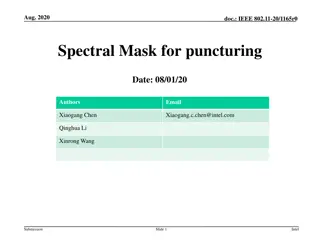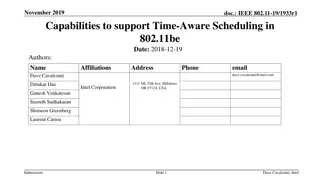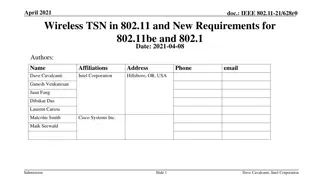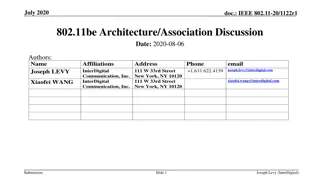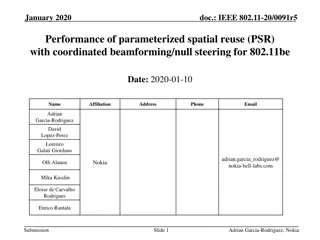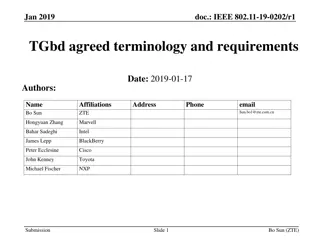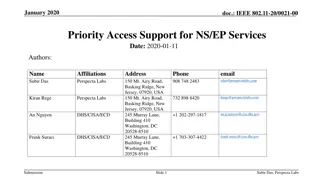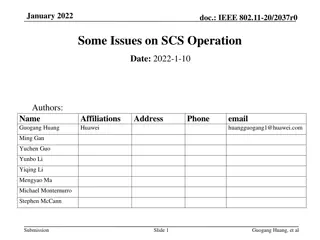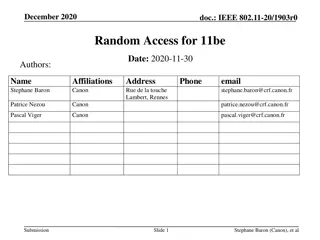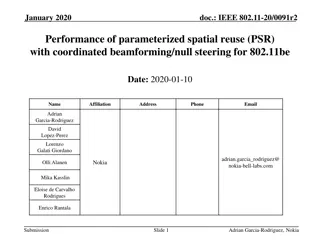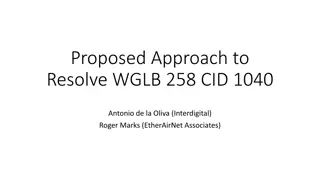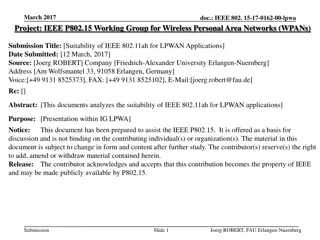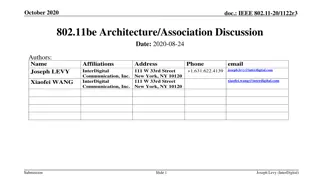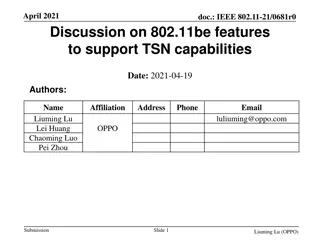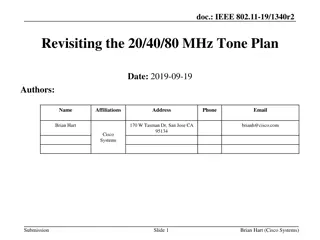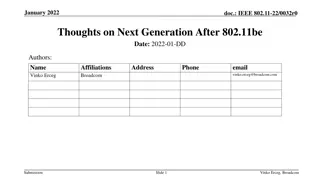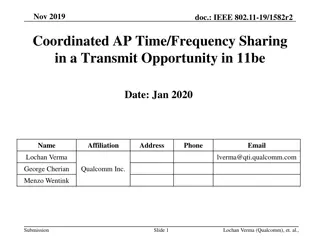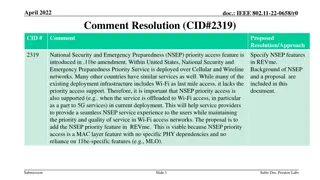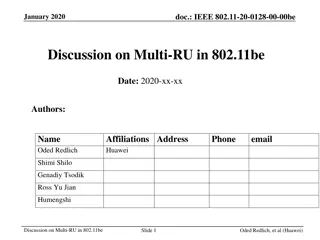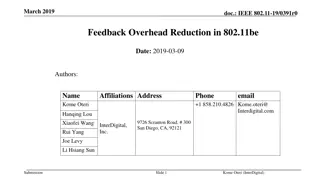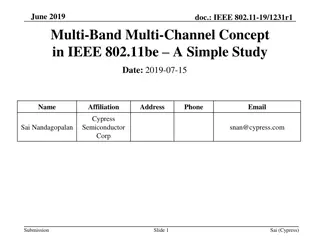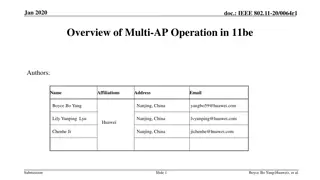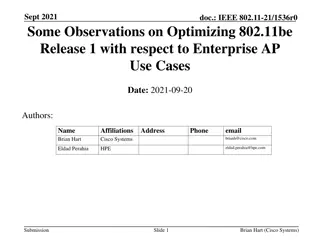Remaining Issues with New 11be Scrambler in IEEE 802.11-20
IEEE 802.11-20/1107r0 discusses the introduction of a new 11-bit scrambler in 11be to reduce payload PAPR. The document addresses issues related to the scrambler seed for CTS in response to MU-RTS transmissions, including the generation of PPDU synchronous scramblers, bit modulation in CTS and MU-RTS, and the handling of special conditions. Recommendations for ensuring robustness and simplicity in the scrambler seeding process are also provided.
Download Presentation

Please find below an Image/Link to download the presentation.
The content on the website is provided AS IS for your information and personal use only. It may not be sold, licensed, or shared on other websites without obtaining consent from the author. Download presentation by click this link. If you encounter any issues during the download, it is possible that the publisher has removed the file from their server.
E N D
Presentation Transcript
doc.: IEEE 802.11-20/1107r0 July 2020 Remaining Issues with New 11be Scrambler Date: 2020-07-21 Authors: Name Affiliations Address Phone Email Lin Yang Youhan Kim Qualcomm Bin Tian Submission Slide 1 Lin Yang (Qualcomm)
doc.: IEEE 802.11-20/1107r0 July 2020 Background 11be introduces new 11-bit scrambler to reduce payload PAPR. The passed SP says The following generator polynomial to generate the PPDU synchronous scrambler is used for EHT PPDU? ? ? = ?11+ ?9+ 1 The 11 bits used for the scrambler initialization are randomly assigned by the transmitter. The polarity of the pilot subcarrier is derived from the same sequence as 802.11ax. [#SP16] [20/0563r1 (EHT PPDU Scrambler, Xiaogang Chen, Intel), SP#1, Y/N/A: 36/12/12 To place the 11 bits scrambling seed we may need to re-define the bits in SERVICE field for EHT PPDU. A natural way to do it is using the 1st 11 LSB bits for 11be scrambling seed and keeping the remaining 5 bits still reserved 11be 11-bit scrambling seed legacy 7-bit scrambling seed Reserved s0 s1 s2 s3 s4 s5 s6 s7 s8 s9s10 0 1 2 3 4 5 6 7 8 9 101112131415 SERVICE field in EHT PPDU Submission Slide 2 Lin Yang (Qualcomm)
doc.: IEEE 802.11-20/1107r0 July 2020 Scrambler Seed for CTS in Response to MU-RTS (1) Multiple STAs send identical CTS in response to MU-RTS using non-HT DUP PPDU Modulated bits in CTS need to be same from all STAs, including scrambling sequence In 11ax, STA copies the 1st 7 bits of SERVICE field in MU-RTS as its scrambling seed for CTS and fill them into the 1st 7 bits of SERVICE field in CTS MU-RTS RX CTS TX SERVICE field of MU-RTS prior to descrambling During first 7 bits of SERVICE s6 s5 s4 s3 s2 s1 s0 SERVICE field of CTS after scrambling. First 7 bits are identical to MU-RTS. DataIn s0 s1 s2 s3 s4 s5 s6 Reserved 0 1 2 3 4 5 6 7 8 9 101112131415 X4 X3 X2 X1 X7 X6 X5 s0 s1 s2 s3 s4 s5 s6 Reserved 0 1 2 3 4 5 6 7 8 9 101112131415 Scrambled Data Out Submission Slide 3 Lin Yang (Qualcomm)
doc.: IEEE 802.11-20/1107r0 July 2020 Scrambler Seed for CTS in Response to MU-RTS (2) If MU-RTS is transmitted using EHT PPDU, MU-RTS has 11 bits of scrambling initial value Can still use the first 7 bits of the SERVICE field in MU-RTS only to scramble the CTS data and fill in the first 7 bits of the SERVICE field of the CTS Need to make sure those 7 bits can t be all 0 to guarantee scrambling Option 1: disallow 1st 7 bits to be all zero for MU-RTS Option 2: the receiving STAs use a default value for CTS scrambling seed, if the received scrambling seed in MU-RTS has 1st 7 bits being all zeros. For example, default value = 127 = all ones = 1111111 We recommend option 1 for its simplicity and robustness Option 2 needs all receiver to handle special condition MU-RTS RX CTS TX SERVICE field of MU-RTS prior to descrambling During first 7 bits of SERVICE s6 s5 s4 s3 s2 s1 s0 SERVICE field of CTS after scrambling. First 7 bits are identical to MU-RTS. Data In Reserved s0 s1 s2 s3 s4 s5 s6 s7 s8 s9s10 0 1 2 3 4 5 6 7 8 9 101112131415 X4 X3 X2 X1 X7 X6 X5 s0 s1 s2 s3 s4 s5 s6 Reserved 0 1 2 3 4 5 6 7 8 9 101112131415 s7-s10 not used for CTS scrambling initialization Scrambled Data Out Submission Slide 4 Lin Yang (Qualcomm)
doc.: IEEE 802.11-20/1107r0 July 2020 SP 1 Do you support using the first 11 LSB bits in SERVICE field for 11be scrambling seed and keeping the remaining 5 bits as reserved? 11be 11-bit scrambling seed legacy 7-bit scrambling seed Reserved s0 s1 s2 s3 s4 s5 s6 s7 s8 s9 s10 0 1 2 3 4 5 6 7 8 9 10 11 12 13 14 15 SERVICE field in EHT PPDU Y/N/ABS Submission Slide 5 Lin Yang (Qualcomm)
doc.: IEEE 802.11-20/1107r0 July 2020 SP 2 Do you support using the first 7 LSB bits of the SERVICE field in MU-RTS to scramble the CTS data and fill in the first 7 LSB bits of the SERVICE field of the CTS, when MU- RTS is transmitted using an EHT PPDU? Y/N/ABS Submission Slide 6 Lin Yang (Qualcomm)
doc.: IEEE 802.11-20/1107r0 July 2020 SP 3 Do you support in 11be to disallow the 7 LSB bits of the SERVICE field in MU-RTS to be all zeros? Y/N/ABS Submission Slide 7 Lin Yang (Qualcomm)


